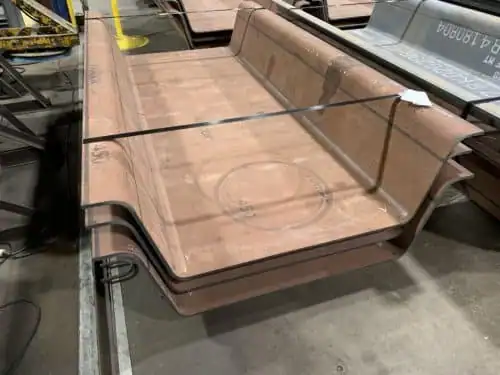Oil and gas, construction, mining, and other industries with harsh operating environments require robust, high-strength materials and equipment. G.E. Mathis Company fabricates custom close-tolerance components from high-strength steel (HSS) designed for optimal performance in these applications. For over a century, we have been providing top-quality custom fabrications for customers around the world.
This guide will provide a comprehensive overview of high-strength steel types and their unique advantages over traditional steel for highly demanding industries and applications.
Table of Contents:
- What Is High-Strength Steel (HSS)?
- Types of High-Strength Steel
- Key Properties and Advantages of HSS
- Common High-Strength Steel Fabrication Challenges
- High-Strength Steel Material Types
- Industries Served
What Is High-Strength Steel (HSS)?
High-strength steel (HSS) is steel that has a yield strength of at least 600 MPa. Exhibiting excellent strength and durability, it is commonly used to fabricate stronger, lighter parts and products used in heavy equipment, construction, production machinery, vehicles, and more. Thinner dimensions of HSS can be used to offer the same or better strength in the final assembly, which saves space, processing time, and labor.
Types of High-Strength Steel
High-strength structural steel is typically categorized into the following types:
- Extremely High-Strength Steel (EHSS). Also called advanced high-strength steel (AHSS), extremely high-strength steel has a yield strength upwards of 1,000 MPa.
- Ultra-high-strength steel (UHSS). With a yield strength of at least 3,000 MPa, Ultra-high-strength steel is considerably stronger than low-strength standard carbon steel, making it ideal for load-bearing projects. It can also withstand high temperatures and corrosive environments.
- High-strength low alloy steel (HSLA). These grades have a high strength-to-weight ratio while offering good ductility and weldability. HSLA is often used in large-scale construction projects but can also be used to fabricate smaller structures such as storage tanks. High-strength low alloy steel demonstrates excellent abrasion and corrosion resistance, ideal for harsh environments such as pipelines, railcars, ships, and offshore drilling platforms.
Key Properties and Advantages of HSS
Compared to conventional steel, HSS offers the following distinct advantages:
- Better ductility
- Better safety and performance
- Easy weldability and laser cutting (HSLA)
- Enhanced tensile strength and hardness
- Improved efficiency and durability
- Increased yield strength
- Significant weight reduction
Common High-Strength Steel Fabrication Challenges
Metal fabricators face several difficulties when working with HSS, which can negatively impact the quality and mechanical properties of the final product. Challenges include:
- Traditional fabrication techniques cannot process many HSS types, especially UHSS and EHSS.
- Fabricators must develop new fabrication techniques or add secondary processing to lower the risk of breakage.
- Fabricators must anticipate how the hot stamping process can change the HSS material’s mechanical properties and microstructure.
- Specialized welding expertise is required to create high-quality components with the desired mechanical properties.
These challenges highlight the importance of working with an experienced HSS fabricator like G.E. Mathis Company. We have the generational knowledge, resources, and capabilities to tackle these challenges and deliver high-quality components that can be used for a wide variety of demanding applications.
High-Strength Steel Material Types
At G.E. Mathis Company, we understand the need for high-quality, durable, reliable parts and products. We have worked extensively on tough projects, providing comprehensive solutions that utilize the following high-strength materials.
Industries Served
Typical industries that utilize high-strength steel include:
- Agriculture
- Automotive
- Construction/Cranes
- Defense
- Heavy machinery
- Industrial manufacturing
- Mining
- Trucks and trailers
Expert High-Strength Steel Fabrication Solutions From G.E. Mathis Company
As a national source and leading supplier of long, close-tolerance, and intricate fabrications, G.E. Mathis Company has vast experience working with specialty materials, such as high-strength steel. Our 135,000-square-foot facility is equipped with state-of-the-art equipment to perform a variety of custom fabrication methods:
Certifications
As an AWS-D1.1 and ISO 9001:2015 certified manufacturer, G.E. Mathis Company provides products and services with the highest standards of quality and safety. For every project, we provide rigorous quality control services, including:
- Production Part Approval Process (PPAP): All levels
- First Article Inspection Report (FAIR)
- Statistical Process Control (SPC): Capability studies
- Conflict Minerals Reporting Template (CMRT)
Contact Our Experts for Your Custom High-Strength Steel Fabrication Needs
High-strength steel is the ideal solution for challenging operations requiring a strong, lightweight material that can withstand extreme environments. With over 120 years of experience, G.E. Mathis Company offers innovative custom solutions for a global client base. Contact us or request a quote to learn more about our capabilities and products.


















